May 26, 2017
On Capitol Hill, we find Democrats acknowledge climate change, affirm the need for action, and sometimes even express frustration and discouragement that there has not been more action. It is as if they need more hope. On the other hand, we find Republicans continue to minimize climate change as a problem or maximize the unworkable unaffordability of a solution. Yet sometimes, off camera and behind the scenes, we encounter Republicans who fear calling for climate action due to the risk of being “primary-ed” or knocked out of an election in a primary. It is as if they need more courage.
Read the Full Article

Already a subscriber? Login
